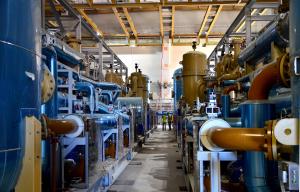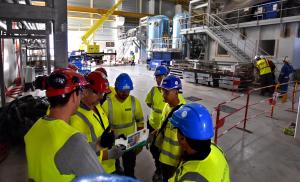Cryoplant
Filled from floor to ceiling
23 Jul 2018
The ITER cryoplant used to be a vast echoey chamber with 5,400 m² of interior space divided into two areas; now, it is filled from floor to ceiling with industrial equipment. Three parties are sharing responsibility for the plant's procurement: the ITER Organization, responsible for the liquid helium plants; Europe, in charge of the liquid nitrogen plant and auxiliary systems as well as the construction of the cryoplant infrastructure on site; and India, whose contractors are procuring the cryolines and cryodistribution components.
The installation of helium compressor skids on concrete pads was completed earlier this year. Aligned in three rows, each one linked to a helium cold box, the compressors will supply the cold boxes with gaseous helium at 21.8 bars and eventually provide the necessary gas flow for the supercritical helium cooling needs of the Tokamak. Team members can be seen standing on the pads in this picture, four metres above ground level. As a final installation step, a special grouting—part cement, part resin—will be poured to federate the pad and the skid into a mechanically homogeneous structure.
Most of the planned components are now installed in the Compressor Building, drastically reducing the space for circulation. Here, a corridor has been created between the huge oil removal system skids of two rows of the liquid helium plant compression station.
For the nitrogen plant, the first phase of centrifugal compressor installation was achieved this month. These compressors (which, at 4.5 MW, are the biggest of the cryoplant) are also housed in the Compressor Building, next to the 18 compressors that will be required for the operation of the helium refrigerators. This month, the compressors were pre-aligned with their motors and after-coolers/associated piping were installed.
Close coordination is required of the different teams that are active in the cryoplant. Co-activity issues are addressed and resolved in dedicated coordination meetings, or in more informal meetings on site. In this picture, representatives of various stakeholders (the ITER Organization, the European Domestic Agency, equipment manufacturer Air Liquide, mechanical installation contractors, and ITER's Construction Management-as-Agent) are assessing potential difficulties in co-activity related to the installation of helium storage gasbags up near the roof at the same time as some HVAC (ventilation) equipment.





